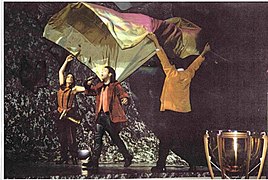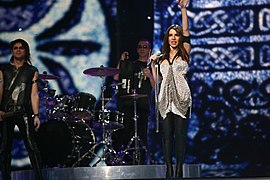Cyprus at the Eurovision Song Contest
This article deals with the history of the Republic of Cyprus as a participant in the Eurovision Song Contest .
Regularity of participation and successes in competition
The Republic of Cyprus first took part in the Eurovision Song Contest in 1981. At the debut the country was immediately successful and reached place 6 out of 20. In 1982 the Republic of Cyprus was able to get a place in the top ten, as the singer Anna Vissi reached place 5 out of 18. With 85 points, it also held the highest score in the Republic of Cyprus for several years. In 1983, on the other hand, the country was less successful for the first time and only came in 16th out of 20. In the following years, the country was unable to build on the successful first two participations. Thus in 1984 with place 15 and 1985 with place 16 out of 19 countries each further placements in the lower third of the table followed. Then in 1986 the Republic of Cyprus reached its lowest point. The singer Elpida landed in last place in the final and thus got the worst position in the Republic of Cyprus to date. Only in the following years did the country regain its competitive edge.
Finally, in 1987, singer Alexia achieved 7th place out of 22, the best ranking in five years. The country also planned to participate in 1988, but it turned out that the song Thimame by the singer Yiannis Dimitrou, which was selected by the Republic of Cyprus, had already participated in the preliminary round in 1984, whereupon the television station CyBC voluntarily withdrew the contribution. As early as 1989, however, the country was represented again in the competition and reached 11th place on its return. In 1990 it was placed in the midfield with 14th place out of 22nd then missed the country with the singer Evridiki, who finished 11th, just under a place in the top ten. In 1993, however, the country was far from such a placement. In the end, the duo Zymboulakis & van Beke only finished 19th out of 25. In 1994 the singer Evridiki tried again to achieve a placement in the top ten. Again, however, it only came in 11th. From 1995 to 1997 the republic was very successful. The country reached 9th place in 1995 and 1996 respectively. In 1997 the duo Hara & Andreas Konstantinou reached 5th place and thus the best position since Anna Vissi 1982. With 98 points they even reached more points than Anna Vissi 1982, so they got a new one Highest number of points achieved for the Republic of Cyprus. This made them the most successful contribution by the Republic of Cyprus to date. After that, however, the country was initially unable to build on these successes.
The country reached 11th place in 1998, but in the following year it got its worst place in twelve years. The singer Marlain ended up only on the penultimate place and received only two points, which is the lowest score in the Republic of Cyprus to date. The country was not very successful in 2000 either. The duo Voice finally only took 21st place out of 24. After these poor placements, the country had to sit out of the competition in 2001, but returned to the competition in 2002. From now on, the competition for the Republic of Cyprus was like a roller coaster ride. After all, the return in 2002 was very successful and the country finished in 6th place. In 2003, the Republic of Cyprus was back at the bottom of the table and landed in 20th place out of 26. In 2004 the next success followed. The country had to compete in the newly introduced semi-finals, but was able to qualify for the final from there. There the singer Lisa Andreas took 5th place and got a new high score for the Republic of Cyprus with 170 points. It also made her the most successful interpreter in the country to date. After this success, a rather poor result followed in 2005. After all, the country was represented for the second time by the singer Constantinos, who took 9th place for the country in 1996. However, he was unable to build on this success and ended up in 18th place out of 24. Therefore, Cyprus had to participate in the semifinals in 2006, but missed the finals for the first time after the singer Annette Artani only reached 15th place in the semifinals. In 2007, the singer Evridiki, who represented the Republic of Cyprus in 1992 and 1994, appeared again. But she also only ended up in 15th place in the semi-finals, so that the country again missed the final. For the first time, Cyprus was missing two times in a row in a final of the competition. In 2008 and 2009, the Cypriot interpreters failed to bring the country back to the finals and ended up in 15th and 14th place. It was not until 2010 that the Republic of Cyprus made it to the finals again after Jon Lilygreen & The Islanders narrowly qualified for the final. But even in the final, the success was relatively low, because the contribution Life Looks Better in Spring only landed in 21st place. In 2011, the country was eliminated in the semifinals and only landed there penultimate place, which was the worst placement since 1999. In 2012, however, the Republic of Cyprus reached the final again, but was able to achieve the best placement since 2004 with 16th place. After this small ray of hope, disappointment followed again in 2013. Finally, as in 2011, the country missed the final and only ended up in penultimate place in the semifinals. In 2014, the country then voluntarily withdrew from the competition for the first time. Finally, the Republic of Cyprus decided not to participate in the Eurovision Song Contest 2014 in Copenhagen for reasons of cost . Previously, the country withdrew from the competition only on allegations of plagiarism, while the country had to suspend in 2001 due to the rules of the time. In 2015 , however, the country returned to the competition.
From now on the country was a little more successful in competition. After all, the Republic of Cyprus was able to qualify for the final in 2015 for the first time in three years. Nevertheless, the country was still not very successful in the final and only landed in 22nd place. The country also qualified for the final in 2016, so that the Republic of Cyprus was represented in the final twice in a row for the first time since 2005. But here, too, the Cypriot entry only finished 21st in the final. Even though the final was reached in 2017, only 21st place was booked in the end. The most successful participation of the Republic of Cyprus in the competition to date followed in 2018. After the singer Eleni Foureira was able to reach 2nd place in the semifinals, her title Fuego also took second place in the final, which is the best placement in the country. With 436 points she also got a new high score for the Republic of Cyprus. With this placement and the associated number of points, she is now the most successful Cypriot interpreter. In 2019 a female interpreter was also selected internally. The singer Tamta could not build on Foureira's success, but still got a better position in the final with 13th place than her previous male representatives.
In total, 15 of the 36 entries ended up in the left half of the table. In addition, the country has only finished last once so far. In addition, the country missed the final six times. Nevertheless, the country has so far achieved place 2 and three times 5. With a few other placements among the top ten, Cyprus is one of the average successful countries in the competition. Nevertheless, it should be noted that since Portugal won the first time in 2017, the Republic of Cyprus, with 36 participations, has been the country that was most frequently represented in the competition without ever winning. Finally, Portugal needs 49 entries to win the competition.
List of posts
Color legend: - 1st place. - 2nd place. - 3rd place. - Equal points with last place. - Eliminated in the semifinals / in the qualification / in the Eastern European preliminary decision. - no participation / not qualified. - Cancellation of the Eurovision Song Contest.
| year | Interpreter | Title Music (M) and Text (T) |
language | translation | final | Semi-final / qualification |
National preliminary decision |
||
|---|---|---|---|---|---|---|---|---|---|
| space | Points | space | Points | ||||||
| 1981 | Iceland |
Monica Μόνικα M: Doros Georgiadis; T: Stavros Sideras |
Greek | - | 6/20 | 69 | Direct participation | internal selection | |
| 1982 |
Anna Vissi Άννα Βίσση |
Mono i agapi Μόνο ή αγάπη M / T: Anna Vissi |
Greek | Just love | 5/18 | 85 | internal selection | ||
| 1983 |
Stavros & Dina Σταύρος & Δήνα |
I agapi akoma zi Η αγάπη ακόμα ζει M / T: Stavros Sideras |
Greek | Love is still alive | 16/20 | 26th | internal selection | ||
| 1984 | Andy Paul |
Anna Maria Lena Άννα Μαρία Λένα M / T: Andy Paul |
Greek | - | 15/19 | 31 | National preliminary decision | ||
| 1985 |
Lia Vissi Λία Βίσση |
To katalava arga Το κατάλαβα αργά M / T: Lia Vissi |
Greek | I realized it too late | 16/19 | 15th | internal selection | ||
| 1986 |
Elpida Ελπίδα |
Tora zo Τώρα ζω M: Peter Yiannakis; T: Peter Yiannakis, Fivos Gavris |
Greek | I live now | 20/20 | 4th | internal selection | ||
| 1987 |
Alexia Αλέξια |
Aspro-mavro Άσπρο - μαύρο M: Andreas Papapaulou; T: Maria Papapaulou |
Greek | White black | 7/22 | 80 | internal selection | ||
| 1988 | Giannis Demetriou Γιάννης Δημητρίου |
Thimame Θυμάμαι M: John Vickers; T: Aristos Moskovaki |
Greek | Recall |
Participation withdrawn song illegal |
internal selection | |||
| 1989 |
Fani Polymeri & Giannis Savvidakis Φανή Πολυμέρη & Γιάννης Σαββιδάκης |
Apopse as vrethoume Απόψε ας βρεθούμε M: Marios Meletiou; T: Efi Meletiou |
Greek | Are we tonight | 11/22 | 51 | Direct participation | internal selection | |
| 1990 |
Haris Anastasiou Χάρης Αναστασίου |
Milas poli Μιλάς πολύ M: John Vickers; T: Haris Anastasiou |
Greek | You are talking too much | 14/22 | 36 | National preliminary decision | ||
| 1991 |
Elena Patroklou Ελενα Πατρόκλου |
SOS M: Kypros charalambus; T: Andreas Christou |
Greek | - | 9/22 | 60 | National preliminary decision | ||
| 1992 |
Evridiki Ευριδίκη |
Teriazoume Ταιριάζουμε M / T: Giorgos Theophanous, Leonidas Malenis |
Greek | We get along | 11/23 | 57 | National preliminary decision | ||
| 1993 |
Zymboulakis & van Beke Ζυμπουλάκης & van Beke |
Mi stamatas Μη σταματάς M: Aristos Moskovakis; T: Rodoula Papalambrianou |
Greek | Do not stop | 19/25 | 17th | National preliminary decision | ||
| 1994 |
Evridiki Ευριδίκη |
Ime anthropos ki ego Είμαι άνθρωπος κι εγώ M / T: Giorgos Theophanous |
Greek | I am human too | 11/25 | 51 | Qualified directly for the final | National preliminary decision | |
| 1995 |
Alexandros Panayi Αλέξανδρος Παναγής |
Sti fotia Στη φωτιά M / T: Alexandros Panayi |
Greek | In the fire | 9/23 | 79 | National preliminary decision | ||
| 1996 |
Constantinos Κωνσταντίνος |
Mono gia mas Μόνο για μας M: Andreas Giorgallis; T: Rodoula Papalambrianou |
Greek | Just for us | 9/23 | 72 | 15/29 | 42 | National preliminary decision |
| 1997 |
Hara & Andreas Konstantinou Χαρά & Ανδρέας Κωνσταντίνου |
Mana mou Μάνα μου M / T: Constantina Konstantinou |
Greek | Motherland | 5/25 | 98 | Qualified directly for the final | National preliminary decision | |
| 1998 |
Michalis Hatzigiannis Μιχάλης Χατζηγιάννης |
Genesis Γένεσις M: Michael Hajiyanni; T: Zenon Zindilis |
Greek | - | 11/25 | 37 | National preliminary decision | ||
| 1999 |
Marlain Μαρλαίν |
Tha 'ne erotas Θά' ναι έρωτας M: Yiorgos Kallis ; T: Andreas Karanicolas |
Greek | It will be love | 22/23 | 2 | National preliminary decision | ||
| 2000 | Voice |
Nomiza Νόμιζα M: A. Panayi; T: A. Panayi, Silvia M. Klemm |
Greek, Italian | I believed | 21/24 | 8th | National preliminary decision | ||
| 2001 | Not qualified | ||||||||
| 2002 | One |
Gimme M / T: Giorgos Theophanous |
English | give me | 6/24 | 85 | Qualified directly for the final | internal selection | |
| 2003 |
Stelios Konstantas Στέλιος Κωνσταντάς |
Feeling Alive M / T: Stelios Constantas |
English | I feel alive | 20/26 | 15th | internal selection | ||
| 2004 | Lisa Andreas |
Stronger Every Minute M / T: Mike Connaris |
English | Stronger every minute | 5/24 | 170 | 5/22 | 149 | National preliminary decision |
| 2005 |
Constantinos Κωνσταντίνος Χριστοφόρου |
Ela ela Ελα Ελα M / T: Constantinos Christoforou |
Greek | Come come | 18/24 | 46 | Qualified directly for the final | National preliminary decision | |
| 2006 | Annette Artani |
Why Angels Cry M / T: Peter Yiannakis |
English | Why angels cry | Eliminated | 15/23 | 57 | A Song for Europe 2006 | |
| 2007 |
Evridiki Ευριδίκη |
Comme ci, comme ça M: Dimitris Korgialas; T: Poseidonas Giannopoulos |
English, French | So-so | Eliminated | 15/28 | 65 | internal selection | |
| 2008 |
Evdokia Kadi Ευδοκία Καδή |
Femme fatale M: Nicos Evagelou; T: Vangelis Evangelou |
Greek | Fateful woman | Eliminated | 15/19 | 36 | National preliminary decision | |
| 2009 |
Christina Metaxa Χριστίνα Μεταξά |
Firefly M / T: Nikolas Metaxas |
English | Firefly | Eliminated | 14/19 | 32 | National preliminary decision | |
| 2010 | Jon Lilygreen & The Islanders |
Life Looks Better in Spring M: Nasos Lambrianides, Melis Konstantinou; T: Nasos Lambrianides |
English | Life looks better in spring | 21/25 | 27 | 10/17 | 67 | Eurovision 2010: Epilogi tis Kipriakis Simmetohis |
| 2011 |
Christos Mylordos Χρίστος Μυλόρδος |
San aggelos s'agapisa Σαν άγγελος σ 'αγάπησα M: Andreas Anastasiou; T: Michalis Antoniou |
Greek | I loved you like an angel | Eliminated | 18/19 | 16 | Performance 2011 | |
| 2012 |
Ivi Adamou Ήβη Αδάμου |
La La Love M / T: Alex Papakonstantinou, Björn Djupström, Alexandra Zakka, Viktor Svensson |
English | La la love | 16/26 | 65 | 7/18 | 91 | A Song for Ivi |
| 2013 |
Despina Olympiou Δέσποινα Ολυμπίου |
An methimase Aν με θυμάσαι M: Andreas Giorgallis; T: Zenon Zindilis |
Greek | If you remember me | Eliminated | 15/16 | 11 | internal selection | |
| 2014 | No participation | ||||||||
| 2015 |
John Karayiannis Γιάννης Καραγιάννης |
One Thing I Should Have Done M / T: John Karagiannis, Mike Connaris |
English | One thing I should have done | 22/27 | 11 | 6/17 | 87 | Eurovision Song Project |
| 2016 | Minus one |
Alter Ego M / T: Thomas G: son , Minus One |
English | alter ego | 21/26 | 96 | 8/18 | 164 | internal selection |
| 2017 |
Hovig Χουίγ / Հովիկ |
Gravity M / T: Thomas G: son |
English | Gravity | 21/26 | 68 | 5/18 | 164 | internal selection |
| 2018 |
Eleni Foureira Ελένη Φουρέιρα |
Fuego M / T: Alex Papaconstantinou, Geraldo Sandell, Anderz Wrethov, Viktor Svensson, Didrick |
English, Spanish | Fire | 2 / 26th | 436 | 2/19 | 262 | internal selection |
| 2019 |
Tamta Τάμτα |
Replay M / T: Alex Papaconstantinou, Geraldo Sandell ("Teddy Sky"), Kristoffer Fogelmark , Albin Nedler, Viktor Svensson |
English | Repetition | 13/26 | 109 | 9/17 | 149 | internal selection |
|
|
Sandro Σάντρο |
Running M: Alfie Arcuri, Sebastian Rickards, Octavian Rasinariu, Sandro , Teo DK ; T: Alfie Arcuri, Sebastian Rickards, Octavian Rasinariu, Sandro |
English | run |
Cancellation due to the COVID-19 pandemic by the EBU |
internal selection | |||
languages
The official languages of the Republic of Cyprus are Greek and Turkish, with all contributions presented in Greek in the years when each country had to sing in a national language. Even after the language rule fell in 1999, the contribution was sung in Greek this year, and in Greek and Italian the following year. As a result, most of the Cypriot contributions were sung in English, with only 2008, 2011 and 2013 sung in Greek; In 2005 only the headline was Greek. In 2007, Comme ci, comme ça was introduced entirely in French. Almost all the songs originally sung in Greek were also recorded in English. Exceptions were the years 1981, 1986, 1994 and 2000. Other contributions were also recorded and published in other languages such as Italian (1993, 1995, 1996, 2000) and French (1992, 1994, 1996). Since 2015, the country has only broadcast English-language contributions - however, Eleni Foureira's 2018 song Fuego had a Spanish title that was repeated several times in the chorus.
National preliminary decisions
Most of the Cypriot contributions were selected through a national preliminary decision. Only 1981 to 1983, 1985 to 1987, 1989, 2002, 2003, 2007, 2013 and since 2016 were the contributions selected internally. All other contributions were determined in various preliminary decision formats.
1984, 1990 to 2000
In 1984 a national preliminary decision with four participants took place for the first time, where a jury determined the winner. In 1990 another qualification was broadcast on television. Ten artists took part, from which a jury selected the winner. Eight singers took part in each of the following years (only seven in 1995, as one contribution was withdrawn) and a 24-member audience jury selected the favorite, and from 1995 an expert jury was responsible. More artists took part in 1999 and 2000, but the jury of experts continued to vote.
2004, 2008 and 2010
In 2004 and 2010 there was a preliminary decision with ten participants; 50% was chosen by the jury and for the first time also 50% by televoting. This system was also used in 2008, but the televoting had a majority of 60%.
2006 and 2009
In 2006, before the final, there were two semi-finals with ten participants each, of which the five best qualified. For the first time, voting took place exclusively by telephone. In 2009, voting was again carried out exclusively by televoting. This time, however, there was only one final with ten candidates.
2011
For 2011, the decision was made for the casting show performance to determine the participant and then the song for the winner was selected internally.
2012
In 2012 the singer was selected internally and the contribution publicly. The jury and audience chose La La Love as the winning title from three titles .
2015
In 2015 a large-scale preliminary decision took place in which only Cypriot singers could participate. While only a jury determined the qualifiers in the auditions, in the final 50% of the audience and 50% of the jury chose the winner from six performers and their songs.
Scoring
The following countries received the most points from or awarded the most points to the Republic of Cyprus (as of 2019):
|
|
|
|
|||||||||||||||||||||||||||||||||||||||||||||||||||||||||||||||||||||||||||||||||||
Award of the highest rating
Since 1981, the Republic of Cyprus has awarded the maximum number of points to eleven different countries, including 25 times to Greece. In the semi-finals, however, the Republic of Cyprus awarded the maximum number of points to nine different countries, nine of which to Greece.
|
|
|||||||||||||||||||||||||||||||||||||||||||||||||||||||||||||||||||||||||||||||||||||||||||||||||||||||||||||||||||||||||||||||||||||||||||||||||||||||||||||||||||||||||||||||||||||||||||||||
various
- The Republic of Zypen has been participating in the competition since 1981 and has not yet won it. With 36 participations (as of 2019), Cyprus has been waiting the longest in terms of the number of participations for a victory. In terms of time, Malta has been waiting the longest for a win. The country has participated since 1971, but with 32 participations it has four fewer participations than Cyprus.
- Since the nationwide introduction of televoting in 1998, the Republic of Cyprus has almost always awarded 12 points to Greece and also received 12 points from Greece. In 1998, the Republic of Cyprus with its twelve points was the only country that gave Greece points at all. There was an exception in 2015 when both countries gave Italy their 12 points. Greece gave the Republic of Cyprus 10 points, while the Republic of Cyprus only gave Greece 8 points, as neighboring Albania was also a favorite in the Southern European region in the Eurovision Song Contest. In 2016, in the first year with separate judges and spectators, Greece failed in the semi-finals for the first time and could not receive any points from Cyprus in the final. In the semifinals, the Greek and Cypriot spectators again awarded each other the highest number of points, while the juries of both countries had decided in favor of Russia .
- In 2003 the Republic of Cyprus awarded points to Turkey for the first time, and in 2004 it received points from Turkey for the first time.
- In 2014, the Republic of Cyprus did not take part in the Eurovision Song Contest for the first time. So far there has only been one participation that was withdrawn due to allegations of plagiarism and one that was not allowed because of the poor placements in the previous year. On the other hand, the Republic of Cyprus often failed to make it through the semi-finals until 2013.
Impressions
Web links
- The texts for all Cypriot contributions (with pictures of the participants)
- The Diggiloo Thrush
Individual evidence
- ↑ eurovisionsongs.net ( Memento from March 1, 2009 in the Internet Archive )
- ↑ esctoday.com
- ↑ eurofire.blog.de ( Memento from June 1, 2014 in the Internet Archive )















